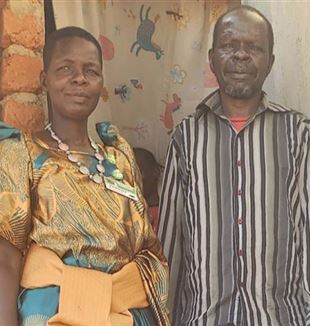
Uganda: Florence's three prayers
She is one of "Rose's women." Her and Obote Milton were to be married in a church 20 years after their marriage in a tribal ceremony. Two weeks before the wedding he was killed. Their story and her words at his funeral.Obote Milton died two weeks before his wedding. He had decided to marry Florence in a church 20 years after their tribal ceremony. Not that all was well between the two, but Florence had wanted it ever since she had met the CL movement at Meeting Point in Kampala, the center started by Rose Busyngye, which takes in people with HIV. She had been marked by that friendship when, isolated from everyone because she was sick, she had discovered a place that did not look at her as someone with an "expiration date." It had all happened in one morning: she got out of bed, took her children with her, and reached Meeting Point. There she had found women like herself, learning to read and write. They were happy, they did not look sick. Many were also working, allowing their children to attend school. This was enough for Florence to stop looking at herself as someone who could only die and decide to begin therapy.
Over the years, Florence had also dragged Obote into that new life. She sold onions, tomatoes and charcoal in her home and he had gotten a job as a supervisor at the Luigi Giussani Primary School, and this had allowed their six children to attend school and college. However, Obote had ups and downs. He often got drunk, and the Luigi Giussani school had fired him and rehired him several times. The same thing happened with Florence, who took him back into the house despite all the trouble he was causing. Nothing had deterred her from her decision to "marry before God." She wanted to return to receive Communion. And then she told everyone that when she died she wanted to go to God as a married woman. So helped by the parish priest and catechists she and Obote had prepared to receive the Sacrament on Easter night this year. But then "Jesus mysteriously sped things up," says Rose, who has been companionship and support for the family throughout this time.
On the night of March 13, Obote was attacked by robbers while on duty at a new school. The man, shot in the head, was in a critical condition. Accompanied by her older children, Florence rushed to the hospital. They would not let her see him. They asked her for money for medicine, oxygen and a CT scan. She put together everything she had and then called Rose. They talked to the doctors; the man needed surgery, but the ICU slots were all filled. After several phone calls, Rose found a hospital that would take him in. Obote was transferred and operated on. Ten days of agony began. His brain hemorrhage had compromised much of his brain, and the prognosis remained bad. Rose raised the money to pay the bills, which were four thousand euros a day. When his death was announced on the morning of March 23, the hospital did not return his body until the last shilling is settled. That day Rose went to Florence’s house together with some friends. They shared a few words to arrange the funeral, as she wished to take her husband's body back to their home village in the North Country. For the rest of the time, they remained in silence.
On the walls of that few square meters shack were the CL Easter and Christmas posters from recent years. Florence occasionally looks at them. They are the most precious thing she owns. In the afternoon, some women from Meeting Point organized the Mass for the arrival of the body. "I was angry," Rose says, "With the doctors, with the thieves, with the health care system. Maybe even with Obote who, because of his alcoholism, had eventually forced us to pull him out of school and get a job in a bad area." It was Florence who pulled her out of all those thoughts when, staggering, she stood up at the prayer of the faithful. "We had never seen a widow speak at a funeral," Rose explains, "What she said made me realize what I was not looking at. I had shut down, my head was fixed on one thing: 'God, electrocute them all. The murderers, the doctors who treated us so badly ...'" Before the congregation that expected to witness the ritual laments, Florence formulated three prayers in acholi. The first for the murderers, "Forgive them, Lord, for they did not know that by killing Obote they were killing You. I pray for them, that by discovering what a precious thing their lives are, they may understand what they did to Obote. May God convert their hearts." The second: "The body is the temple of God and the soul cannot be killed. Today is a day of celebration because Obote is now with the Creator." And finally, "I thank God for the strength He has given me in raising my children. I ask that He give me more, because I need it to continue living."
Read also - "These nuns are not afraid"
Rose, who until that moment had been unable to look at the coffin, finally looked up. "Her words gave me a sense of total justice. If God was the fabric of what was happening, then Obote was saved. Florence returned him to me perhaps more than if I had succeeded in saving him with all my attempts. More than if God had done justice as I intended." Rose was impressed by Florence’s clear conscience. "That is something I often get with these women. They are simple, uneducated, but they come to me with sentences that cannot help but flow from a living experience. Sometimes I suspect that the Mystery gives them nightly private lessons...."